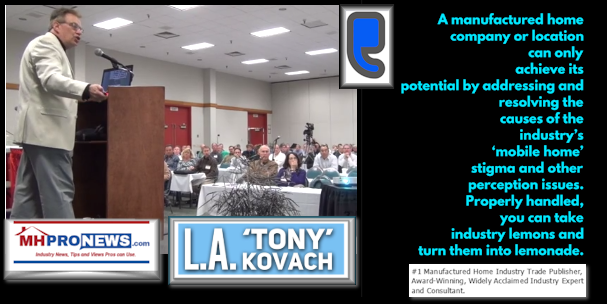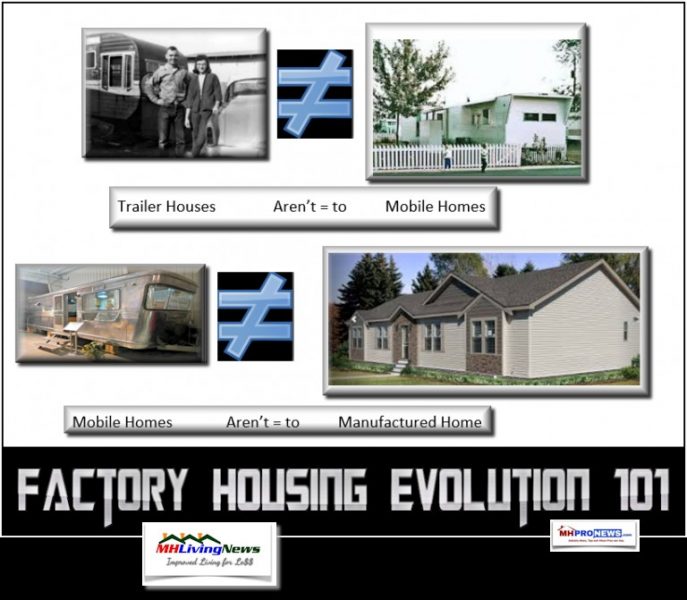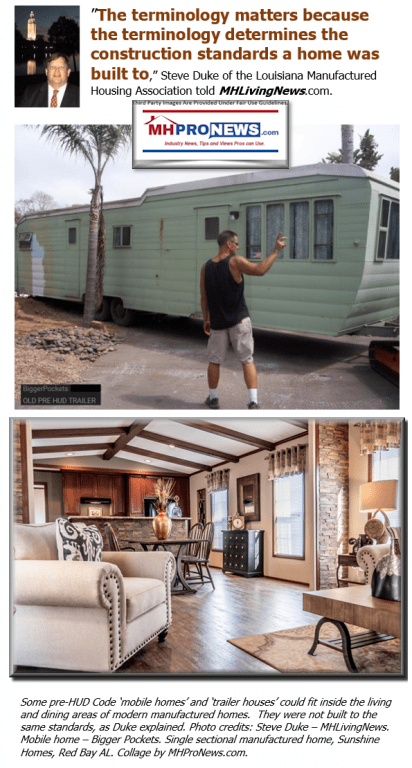We’ll begin with a punchline – a not the – punchline. Then this article will provide some context for that punchline – the reasons why it should be taken seriously. That context will be followed by facts that virtually every experienced manufactured home professional will have to agree is accurate. Then, we’ll hit additional punch lines – all of it educational and informational. Each of these, if properly put into practice, will prove valuable to you and your firm.
For those who want to go deeper, that’s available too.
Having teed up the topic with the headline, here is a (not the) punchline.
- If you have a sales center or community that sales ‘mobile home’ you may as well have a sign that says ‘well qualified customers should shop elsewhere.’
Some will see that very differently. That claim will be controversial or counterintuitive to some, but let’s see why these are facts, not a mere opinion.
Why should you dig deeper? Simple.
- Do you want your sales to go higher?
- Do you want to attract a more qualified class of customers, without losing your current customer base?
- Let’s note there are exceptions to the rule. For example, a prime caveat to that; if you have a community that is truly filled with mostly pre-HUD Code mobile homes, by all means, go ahead and call it as it is. But if you have post-HUD Code manufactured homes, built on or after June 15, 1976, don’t just blithely substitute the term ‘mobile home’ for ‘manufactured home.’ It is a marketing and sales mistake.
- It pays to define terminology accurately and honestly.
- It pays to be disciplined on terminology.
First-time readers here might note that this is a marketing and sales blog focused on manufactured housing. Newer readers might also familiarize yourself with the experience of the writer and what literally scores of third parties have said about our pro-industry and pro-growth work (see link below Al Cole’s kind quote, below).
Fundamental Background
- The parent company and management of MHProNews and MHLivingNews believe in free enterprise and free speech, within the norms of good business ethics and the law.
- We also believe that customers should be treated honestly, with respect, and that the goal of every transaction should be to make the customer so pleased with their product and/or service that they will want to send you their family and friends.
- Customer satisfaction can be accomplished without getting walked on, but that is another story for another time.

A few more disclosures are warranted.
- Most industry pros know us for publishing MHProNews and MHLivingNews, which is fine, thanks. But thousands don’t realize how much proven business development consulting we have done over the years. The reason to look at the link with the Al Cole quote above is to get a sense of what real professionals who know our work have to say about it. When dozens of professionals who know our work first hand say similar things, that merits a closer look.
I’ve Been on Both Sides of the “Mobile Home” – “Manufactured Home” Nomenclature Debate
- Like tens of thousands of industry firms and professionals, I’ve personally been on each side of this professional debate about terminology. This isn’t mere opinion. It is based on third party evidence as well as decades of experience.
- We’ve done projects deemed successful by the client/companies from border to border. Those projects have included: retail, finance, production/factory builders, land lease communities, events, and associations, to name but a few examples. We know the HUD Code manufactured home industry business well.
- I’ve worked personally with untold thousands of retail customers. Additionally, I’ve supervised/coached the sales of thousands of others in the front-lines of retail and communities. So, this column isn’t hypothetical. It is practical and pragmatic.
- Mistakes made – if candidly examined – are opportunities to learn how to do something right. Professionals should routinely test to see if what they are doing is merely okay, or if better methods are available.
One last disclosure in this preface. The single most problematic point for me has never been dealing with the public. Frankly, the home shopping public is generally rather easy to deal with, once they are understood and respected. The real challenge is in navigating the various hidden agendas or landmines with other professionals.
- Company, corporate, or association politics, sensitive egos, and concealed agendas with a client or prospect are far more challenging than working with a home shopper.
- “First you form your habits, then your habits form you.” Admit it or not, pros get stuck in their ways, may or may not be arrogant or too proud to admit that there might be a better way, etc.
- The more successful some people become, the less likely some are to listen, even when there is evidence, reason, to do things differently and better.
- Contrary to what some might think, this writer is a fun- and peace-loving guy. I have no problem getting along with people of whatever background, so long as they don’t go out of their way to do me or mine harm. Once double-crossed, I don’t wait for that to occur again. “Fool me once, shame on you, fool me twice, shame on me” is a mantra that I’ve come to understand.
Now, with that backdrop, let’s deal with what should be a simple topic, but what is arguably going the wrong way for far too many in our industry.
Terminology.
- Let me stress that some are making the terminology error with innocent intentions.
- Others in MHVille ought to know better, because they have access to good research, and may be misusing Mobile/Manufactured Home Terminology deliberately to limit the industry’s acceptance and thus its total results.
- Keep that last point in mind, because some by ‘following a leader’ are being led into an alleyway that has a dead-end.
Stating the Obvious
Stating the Obvious, like the points above, brings clarity to a topic. Sometimes the hardest thing to do is to effectively communicate with someone, be it a new face or an old friend. You are thinking X, they are thinking Y. Cutting through that irksome reality is useful in marketing and sales.
There is a marketer’s mantra that is so obvious, that it is sad that it needs to be said. But given the affordable housing crisis, and the underwhelming performance of our industry in that crisis, here is the phrase.
- In business or professionally, you either define yourself, or others will define you. If others are allowed to define you, they will often do so to your disadvantage.
There is research as well as anecdotal evidence that suggests that the term ‘trailer house’ is a turn off to millions. Similarly, the term mobile home – not as bad – still has a nose-in-the-air impact on millions too.
So, why would anyone that knows better use the phrase ‘trailer house’ or ‘mobile home?’ The answer other marketers and sellers give me is SEO, Search Engine Optimization. There are more searches online for the term Mobile Home, or Trailer House, so they use that term on their website. I get that, but that is the start of the story, not the end.
That’s easily handled. You use the word mobile home to explain that there have been none have been built in the United States since June 15, 1976. Mobile homes evolved into the improved manufactured homes, which several third-party studies prove manufactured homes are superior to mobile homes.
Recently, a publicly held company chairman in our industry said that he thinks the industry’s greater potential is in the middle- or higher end. Of course. That’s stating the obvious, which brings clarity – we concur and have said the same for years. That doesn’t mean that one has to abandon the entry level product. Millions of Americans will never be able to afford more than a ‘shade and shelter’ 14×70 or a 16×60. Millions should have that opportunity.
But to sell the more upscale customer, isn’t it just common sense to use a phrase or name that is not only accurate, but is also more appealing? Hold that thought, as you ponder these next points.
- There are millions of Americans who demonstrably wouldn’t be caught dead on a mobile home or trailer house dealership lot.
- Yet, some 500,000 a year will walk into an RV dealership, and tow or drive away with something far more expensive per square foot that is also built on a chassis? Do you see the disconnect there?
Or think of this.
- Hundreds of thousands to millions will watch a ‘tiny house’ video. But in our industry, thousands of videos get only a tiny fraction of that level of viewing.
- Yet many of those tiny houses are built on a chassis. Those tiny houses are towed. Much like an RV, the cost per square foot is significantly higher than a manufactured home.
- Despite their popularity online, how many are actually buying a tiny house compared to sales of HUD Code manufactured homes?
Two more points.
- In 2018, about 6 million Americans bought a new or existing conventional house. How many of those might have been better off buying a new HUD Code manufactured home than buying a new or existing site-built house?
- In 2018, according to Apartment List, there are an estimated 111 million Americans living in apartment or other kinds of rental housing. How many of those are paying as much or more for rent that could be making monthly payments on a manufactured home?
The Takeaways?
The lessons learned from the above FACTS are many. Let’s boil it down to a few gems.
- Image – understanding – which includes nomenclature or terminology – are a key issue for our industry.
- There is the easy way, which is followed by thousands in our industry. That easy way is to go with the flow and say ‘mobile home’ or ‘trailer house.’ But going with the flow proves the point. The easy way is not producing results that help manufactured home sellers achieve their true potential.
- It takes discipline, a willingness and a desire to learn something new that is proven to increase both traffic and sales. That can be accomplished without losing your current base of business.
We’ve curated and created several educational items that help consumers – and industry pros – properly define the industry’s product. Among them are the graphics below and elsewhere herein.
Let’s be clear. The customer looking for a ‘mobile home’ or a ‘trailer house’ is going to come to your sales center and/or community anyway. It makes no sense to target that market. What makes sense is to target the hundreds of thousands to millions in your market area that misunderstand what a manufactured home is.
- Education is not the only thing that a manufactured home operation needs in order to grow to its potential. But it is absolutely part of the mix.
- That education that is needed doesn’t start with the public, but it must include the public. Education must start with industry professionals, especially those on the front lines.
- Those front-line sales agents must be encouraged by management to do what is smart to get more sales from better qualified customers. That means that better qualified customers must come your way to being with.
When something is free, it is used. We have created the runaway most-read trade publication, in part because it is free. You don’t charge your prospects to come in the door of your community or sales center, do you? Of course not, you let them walk in free.
But once they visit your website or social media, once they email, message, call, or come – that is when the attraction and educational effort must begin.
If your company has been in business for 4 or more years, you are already a success story. We don’t do much business with failures. Our business development side routinely does business with already successful companies. What we do is collaborative, building on your current strengths, but providing proven methods to minimize your weaknesses. We also show you how to tap into opportunities that you are almost 100 percent guaranteed not to be fully engaged with.
- We’ve worked with retailers that have ugly to beautiful sales centers.
- We’ve worked with communities that have plain vanilla to stunning land-lease manufactured home communities.
Most of our clients, but not all, have been successful with our methods. Why is it successful? When is it not successful?
- Our methods are successful in part because what we teach is not high pressure. Our methods are obviously different, though, and use a creative, proprietary, common-sense approach.
- What causes many to succeed, but some to fail? In the end, it comes to down to discipline and motivation. Before we take a dime from a prospective client, we tell them plainly, what will you do if your sales or leasing professional doesn’t follow instructions? Of course, we will all try to encourage someone as much as possible. But what if they can’t or won’t do what is asked?
There are times when a front-line sales professional must be replaced, or a new role elsewhere for that person is found.
The first step is to see where you and your team are at. Ponder this. How much is an underperforming salesperson costing you?
Think that through. Because missed sales are what pays for services like ours many times over.
If you go from 10 percent conversion rate to 20 percent, you’ll pocket a lot more money. If you go from 10 percent to 30 percent or more, so much the better. No one will get everyone. But if you can get about 30 percent plus conversion rates of walk-ins to purchases, you’re sales center will become significantly more profitable. It is unlikely you’re sales center is doing 30 percent, but if it was, with our system, it will likely go higher still.
SWOT Analysis, Defined, Examples
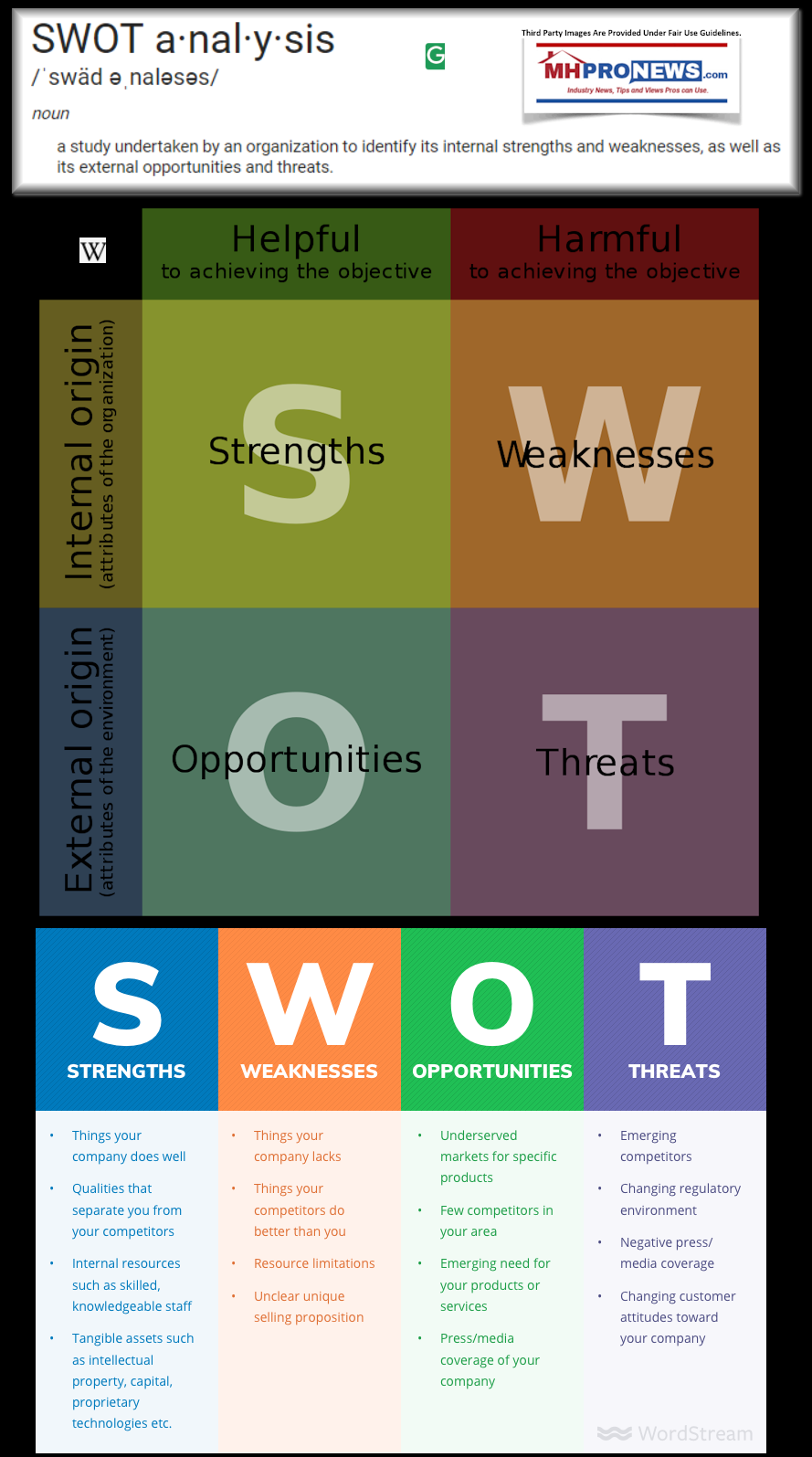
Every successful business can benefit from an objective SWOT of a location and team. SWOT is short for Strengths. Weaknesses. Opportunities. Threats.
That said, key desired outcomes are these.
- You want to get a higher percentage of conversions from leads to arrivals.
- You then want to get more arrivals to become buyers.
- You want more of those buyers to be happy enough to send you their referrals.
- You then want to attract a more qualified class of customer, so that you GP on each sale can go higher still.
Positive change comes from understanding and positive changes based upon reality. That’s just common sense.
There are different budgets that operations have for this kind of investment. A prudent first step, that for some would be the only step, is the following.
- SWOT plus Videos. Ideally, every successful operation should have an objective evaluation of its sales team and processes. The goal is never to throw some salesperson or manager under the bus. Rather, it is to determine where a team member is, how well a location is performing, and get a written report.
- The second part of that is while that evaluation is occurring, our team can and should be doing video interviews with your team and several of your happy customers. Packages that provide a written post-evaluation SWOT plus videos are about $25,000. When the value of the videos are factored, it is like getting the SWOT analysis for free.
- Ongoing market and sales training based upon that SWOT and the outcome of those videos can be quoted on a one-on-one basis.
The bottom lines are these.
- Don’t go with the flow on terminology or marketing/sales methods.
- Sam Zell, Equity LifeStyle Properties chairman, wisely said “When others are going left, look right.” The only way to get a superior result is by doing something different and better than others.
- Do what will establish you as the best place to do business.
- Once our operation produces videos for you, as described above, we can post them on MHLivingNews, which can give you the edge in the marketplace.
To learn more about our results or to contact us, click here.
We’ll begin with a punchline – a not the – punchline. Then this article will provide some context for that punchline – the reasons why it should be taken seriously. That context will be followed by facts that virtually every experienced manufactured home professional will have to agree is accurate. Then, we’ll hit additional punch lines. Each of them, if properly put into practice, will prove valuable to you and your firm.
Having teed up the topic with the headline, here is a (not the) punchline.
If you have a sales center or community that sales ‘mobile home’ you may as well have a sign that says ‘well qualified customers should shop elsewhere.’
Some will see that very differently. That will be controversial to some, but let’s see why this is a fact, not a mere opinion.
Why should you dig deeper? Simple.
• Do you want your sales to go higher?
• Do you want to attract a more qualified class of customers, without losing your current customer base?
• Let’s note there are exceptions to the rule. For example, a prime caveat to that; if you have a community that is truly filled with mostly pre-HUD Code mobile homes, by all means, go ahead and call it as it is. But if you have post-HUD Code manufactured homes, built on or after June 15, 1976, don’t just blithely substitute the term ‘mobile home’ for ‘manufactured home.’ It is a marketing and sales mistake.
• It pays to define terminology accurately and honestly.
• It pays to be disciplined on terminology.
First-time readers here might note that this is a marketing and sales blog focused on manufactured housing. Newer readers might also familiarize yourself with the experience of the writer and what literally scores of third parties have said about our pro-industry and pro-growth work (see link below Al Cole’s kind quote, below).
Fundamental Background
• The parent company and management of MHProNews and MHLivingNews believe in free enterprise and free speech, within the norms of good business ethics and the law.
• We also believe that customers should be treated honestly, with respect, and that the goal of every transaction should be to make the customer so pleased with their product and/or service that they will want to send you their family and friends.
• Customer satisfaction can be accomplished without getting walked on, but that is another story for another time.
A few more disclosures are warranted.
• Most industry pros know us for publishing MHProNews and MHLivingNews, which is fine, thanks. But thousands don’t realize how much proven business development consulting we have done over the years. The reason to look at the link with the Al Cole quote above is to get a sense of what real professionals who know our work have to say about it. When dozens of professionals who know our work first hand say similar things, that merits a closer look.
I’ve Been on Both Sides of the “Mobile Home” – “Manufactured Home” Nomenclature Debate
• Like tens of thousands of industry firms and professionals, I’ve personally been on each side of this professional debate about terminology. This isn’t mere opinion. It is based on third party evidence as well as decades of experience.
• We’ve done projects deemed successful by the client/companies from border to border. Those projects have included: retail, finance, production/factory builders, land lease communities, events, and associations, to name but a few examples. We know the HUD Code manufactured home industry business well.
• I’ve worked personally with untold thousands of retail customers. Additionally, I’ve supervised/coached the sales of thousands of others in the front-lines of retail and communities. So, this column isn’t hypothetical. It is practical and pragmatic.
• Mistakes made – if candidly examined – are opportunities to learn how to do something right. Professionals should routinely test to see if what they are doing is merely okay, or if better methods are available.
One last disclosure in this preface. The single most problematic point for me has never been dealing with the public. Frankly, the home shopping public is generally rather easy to deal with, once they are understood and respected. The real challenge is in navigating the various hidden agendas or landmines with other professionals.
• Company, corporate, or association politics, sensitive egos, and concealed agendas with a client or prospect are far more challenging than working with a home shopper.
• “First you form your habits, then your habits form you.” Admit it or not, pros get stuck in their ways, may or may not be arrogant or too proud to admit that there might be a better way, etc.
• The more successful some people become, the less likely some are to listen, even when there is evidence, reason, to do things differently and better.
• Contrary to what some might think, this writer is a fun- and peace-loving guy. I have no problem getting along with people of whatever background, so long as they don’t go out of their way to do me or mine harm. Once double-crossed, I don’t wait for that to occur again. “Fool me once, shame on you, fool me twice, shame on me” is a mantra that I’ve come to understand.
Now, with that backdrop, let’s deal with what should be a simple topic, but what is arguably going the wrong way for far too many in our industry.
Terminology.
• Let me stress that some are making the terminology error with innocent intentions.
• Others in MHVille ought to know better, because they have access to good research, and may be misusing Mobile/Manufactured Home Terminology deliberately to limit the industry’s acceptance and thus its total results.
• Keep that last point in mind, because some by ‘following a leader’ are being led into an alleyway that has a dead-end.
Stating the Obvious
Stating the Obvious, like the points above, brings clarity to a topic. Sometimes the hardest thing to do is to effectively communicate with someone, be it a new face or an old friend. You are thinking X, they are thinking Y. Cutting through that irksome reality is useful in marketing and sales.
There is a marketer’s mantra that is so obvious, that it is sad that it needs to be said. But given the affordable housing crisis, and the underwhelming performance of our industry in that crisis, here is the phrase.
In business or professionally, you either define yourself, or others will define you. If others are allowed to define you, they will often do so to your disadvantage.
There is research as well as anecdotal evidence that suggests that the term ‘trailer house’ is a turn off to millions. Similarly, the term mobile home – not as bad – still has a nose-in-the-air impact on millions too.
So, why would anyone that knows better use the phrase ‘trailer house’ or ‘mobile home?’ The answer other marketers and sellers give me is SEO, Search Engine Optimization. There are more searches online for the term Mobile Home, or Trailer House, so they use that term on their website. I get that, but that is the start of the story, not the end.
That’s easily handled. You use the word mobile home to explain that there have been none have been built in the United States since June 15, 1976. Mobile homes evolved into the improved manufactured homes, which several third-party studies prove manufactured homes are superior to mobile homes.
Recently, a publicly held company chairman in our industry said that he thinks the industry’s greater potential is in the middle- or higher end. Of course. That’s stating the obvious, which brings clarity – we concur and have said the same for years. That doesn’t mean that one has to abandon the entry level product. Millions of Americans will never be able to afford more than a ‘shade and shelter’ 14×70 or a 16×60. Millions should have that opportunity.
But to sell the more upscale customer, isn’t it just common sense to use a phrase or name that is not only accurate, but is also more appealing? Hold that thought, as you ponder these next points.
• There are millions of Americans who demonstrably wouldn’t be caught dead on a mobile home or trailer house dealership lot.
• Yet, some 500,000 a year will walk into an RV dealership, and tow or drive away with something far more expensive per square foot that is also built on a chassis? Do you see the disconnect there?
Or think of this.
• Hundreds of thousands to millions will watch a ‘tiny house’ video. But in our industry, thousands of videos get only a tiny fraction of that level of viewing.
• Yet many of those tiny houses are built on a chassis. Those tiny houses are towed. Much like an RV, the cost per square foot is significantly higher than a manufactured home.
• Despite their popularity online, how many are actually buying a tiny house compared to sales of HUD Code manufactured homes?
Two more points.
• In 2018, about 6 million Americans bought a new or existing conventional house. How many of those might have been better off buying a new HUD Code manufactured home than buying a new or existing site-built house?
• In 2018, according to Apartment List, there are an estimated 111 million Americans living in apartment or other kinds of rental housing. How many of those are paying as much or more for rent that could be making monthly payments on a manufactured home?
The takeaways from the above FACTS are many. Let’s boil it down to a few gems.
• Image – understanding – which includes nomenclature or terminology – are a key issue for our industry.
• There is the easy way, which is followed by thousands in our industry. That easy way is to go with the flow and say ‘mobile home’ or ‘trailer house.’ But going with the flow proves the point. The easy way is not producing results that help manufactured home sellers achieve their true potential.
• It takes discipline, a willingness and a desire to learn something new that is proven to increase both traffic and sales. That can be accomplished without losing your current base of business.
We’ve curated several educational items that help consumers – and industry pros – properly define the industry’s product. Among them are the graphics above and below.
Definitions
Let’s be clear. The customer looking for a ‘mobile home’ or a ‘trailer house’ is going to come to your sales center and/or community anyway. It makes no sense to target that market. What makes sense is to target the hundreds of thousands to millions in your market area that misunderstand what a manufactured home is.
Education is not the only thing that a manufactured home operation needs in order to grow to its potential. But it is absolutely part of the mix.
That education that is needed doesn’t start with the public, but it must include the public. Education must start with industry professionals, especially those on the front lines.
Those front-line sales agents must be encouraged by management to do what is smart to get more sales from better qualified customers. That means that better qualified customers must come your way to being with.
When something is free, it is used. We have created the runaway most-read trade publication, in part because it is free. You don’t charge your prospects to come in the door of your community or sales center, do you? Of course not, you let them walk in free.
But once they visit your website or social media, once they email, message, call, or come – that is when the attraction and educational effort must begin.
If your company has been in business for 4 or more years, you are already a success story. We don’t do much business with failures. Our business development side routinely does business with already successful companies. What we do is collaborative, building on your current strengths, but providing proven methods to minimize your weaknesses. We also show you how to tap into opportunities that you are almost 100 percent guaranteed not to be fully engaged with.
• We’ve worked with retailers that have ugly to beautiful sales centers.
• We’ve worked with communities that have plain vanilla to stunning land-lease manufactured home communities.
Most of our clients, but not all, have been successful with our methods. Why is it successful? When is it not successful?
Our methods are successful in part because what we teach is not high pressure. Our methods are obviously different, though, and use a creative, proprietary, common-sense approach.
What causes many to succeed, but some to fail? In the end, it comes to down to discipline and motivation. Before we take a dime from a prospective client, we tell them plainly, what will you do if your sales or leasing professional doesn’t follow instructions? Of course, we will all try to encourage someone as much as possible. But what if they can’t or won’t do what is asked?
There are times when a front-line sales professional must be replaced, or a new role elsewhere for that person is found.
The first step is to see where you and your team are at. Ponder this. How much is an underperforming salesperson costing you?
Think that through. Because missed sales are what pays for services like ours many times over.
If you go from 10 percent conversion rate to 20 percent, you’ll pocket a lot more money. If you go from 10 percent to 30 percent or more, so much the better. No one will get everyone. But if you can get about 30 percent plus conversion rates of walk-ins to purchases, you’re sales center will become significantly more profitable. It is unlikely you’re sales center is doing 30 percent, but if it was, with our system, it will likely go higher still.
SWOT
Every successful business can benefit from an objective SWOT of a location and team. SWOT is short for Strengths. Weaknesses. Opportunities. Threats.
That said, key desired outcomes are these.
You want to get a higher percentage of conversions from leads to arrivals.
You then want to get more arrivals to become buyers.
You want more of those buyers to be happy enough to send you their referrals.
You then want to attract a more qualified class of customer, so that you GP on each sale can go higher still.
Positive change comes from understanding and positive changes based upon reality. That’s just common sense.
There are different budgets that operations have for this kind of investment. A prudent first step, that for some would be the only step, is the following.
- SWOT plus Videos. Ideally, every successful operation should have an objective evaluation of its sales team and processes. The goal is never to throw some salesperson or manager under the bus. Rather, it is to determine where a team member is, how well a location is performing, and get a written report.
- The second part of that is while that evaluation is occurring, our team can and should be doing video interviews with your team and several of your happy customers. Packages that provide a written post-evaluation SWOT plus videos are about $25,000. When the value of the videos are factored, it is like getting the SWOT analysis for free.
- Ongoing market and sales training based upon that SWOT and the outcome of those videos can be quoted on a one-on-one basis.
The bottom lines are these.
- Don’t go with the flow on terminology or marketing/sales methods.
- Sam Zell, Equity LifeStyle Properties chairman, wisely said “When others are going left, look right.”
- Do what will establish you as the best place to do business.
- Once our operation produces videos for you, as described above, we can post them on MHLivingNews, which can give you the edge in the marketplace.
To learn more about our results or to contact us, click here. “We Provide, You Decide.” © ## (News, analysis, fact-checks, and commentary. See Related Reports, further below. Text/image boxes often are hot-linked to other reports that can be access by clicking on them. Third-party images and content are provided under fair use guidelines.)
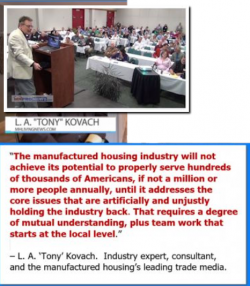 By L.A. “Tony” Kovach – for MHProNews.com.
By L.A. “Tony” Kovach – for MHProNews.com.
Tony earned the Lottinville Award in history from the University of Oklahoma. He has earned multiple awards in manufactured housing and in history. He’s a managing member of LifeStyle Factory Homes, LLC, the parent company to MHProNews, and MHLivingNews.com.
Office 863-213-4090 |Connect on LinkedIn: http://www.linkedin.com/in/latonykovach
Sign Up Today!

Click here to sign up in 5 seconds for the manufactured home industry’s leading – and still growing – emailed headline news updates.
Related References:
The text/image boxes below are linked to other reports, which can be accessed by clicking on them.


